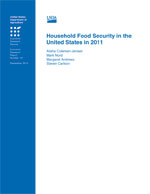Household Food Security in the United States in 2011
by
Alisha Coleman-Jensen,
Mark Nord,
Margaret Andrews, and Steven Carlson
Economic Research Report No. (ERR-141) 37 pp, September 2012
 An estimated 85.1 percent of American households were food secure throughout the entire year in 2011, meaning that they had access at all times to enough food for an active, healthy life for all household members. The remaining households (14.9 percent) were food insecure at least some time during the year, including 5.7 percent with very low food security—meaning that the food intake of one or more household members was reduced and their eating patterns were disrupted at times during the year because the household lacked money and other resources for food. The prevalence rate of very low food security increased from 5.4 percent in 2010, returning to the level observed in 2008 and 2009. The change in food insecurity overall (from 14.5 percent in 2010) was not statistically significant. The typical food-secure household spent 24 percent more on food than the typical food-insecure household of the same size and household composition. Fifty-seven percent of all food-insecure households participated in one or more of the three largest Federal food and nutrition assistance programs during the month prior to the 2011 survey.
An estimated 85.1 percent of American households were food secure throughout the entire year in 2011, meaning that they had access at all times to enough food for an active, healthy life for all household members. The remaining households (14.9 percent) were food insecure at least some time during the year, including 5.7 percent with very low food security—meaning that the food intake of one or more household members was reduced and their eating patterns were disrupted at times during the year because the household lacked money and other resources for food. The prevalence rate of very low food security increased from 5.4 percent in 2010, returning to the level observed in 2008 and 2009. The change in food insecurity overall (from 14.5 percent in 2010) was not statistically significant. The typical food-secure household spent 24 percent more on food than the typical food-insecure household of the same size and household composition. Fifty-seven percent of all food-insecure households participated in one or more of the three largest Federal food and nutrition assistance programs during the month prior to the 2011 survey.
Keywords: Food security, food insecurity, food spending, food pantry, soup kitchen, emergency kitchen, material well-being, SNAP, Food Stamp Program, National School Lunch Program, WIC
In this publication...
Charts and graphs (in .png format) from this report are available in the .zip file listed below. The .zip file also contains a document (readme.txt) that lists the name and title of each chart or graph file.
Need help with PDFs?
Order this Publication